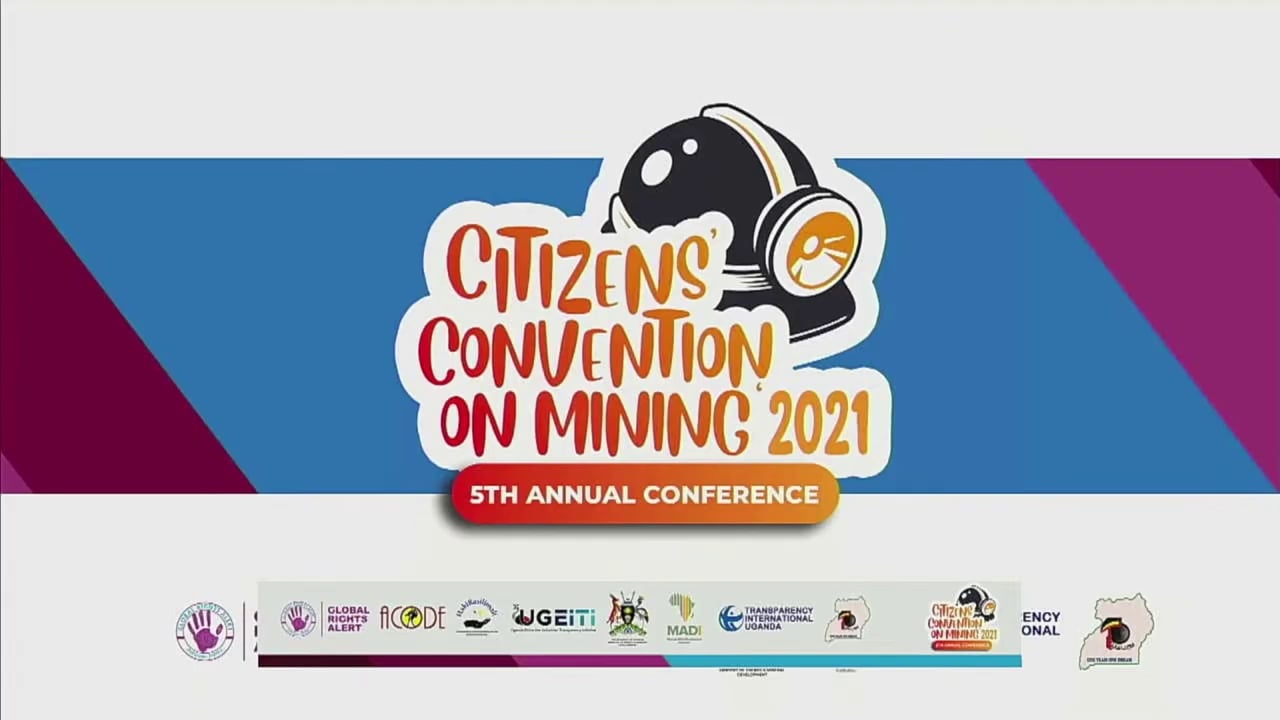
Search


In October 2021, GRA and Ministry of Energy and Minerals Development collaborated with- Uganda Extractive Industries Transparency Initiative (UGEITI) Secretariat, HakiRasimali Tanzania, Advocates Coalition for Development and Environment (ACODE), Minerals Africa Development Institution (MADI), Transparency International Uganda (TIU), and Uganda Association of Artisanal and Small-Scale Miners (UGAASM)- to host the 5th Annual Citizens' Convention on Mining (CCM).
The Citizens' Convention on Mining drew more than 100 online participants, offering a platform for discussions on harnessing the potential of East Africa's mineral wealth for sustainable regional development. The implicit objective of the Convention was to facilitate local activism and provide a platform for impacted communities to take meaningful action and contribute towards building a shared vision of a more inclusive, responsible, and sustainable extractives sector. Accordingly, the Mining Convention attracted policymakers, industry experts, private sector players, regulators, civil society, and community representatives across the East and Southern African regions who deliberated on the theme "Transforming East Africa's Mining sector for inclusive and sustainable Mineral wealth exploitation."
The Convention began with big-picture discussions on priorities and strategies to support the domestication of the Africa Mining Vision- to foster transparent, equitable, and optimal exploitation of Africa's mineral resources to spur wide-ranging sustainable growth and socio-economic development on the African continent.
Talking points explicitly focused on identifying action and investment opportunities that can help accelerate progress towards the Africa Mining Vision. Participants stress the importance of transparency, political leadership, and a willingness to prioritize adopting or enacting supportive regulatory and administrative frameworks, instituting budgetary mechanisms necessary to bring the Africa Mining Vision from paper to practice.
The deliberations mainly shined a spotlight on the need to roll out a legislated level playing field that can be enforced by national, regional, and international regulators.
Discussions further highlighted the importance of domesticating the global frameworks, standards, and principles to reflect East African regional values and creating detailed road maps to achieve them. Here, participants revealed that there is much to be done to develop specific implementation measures that resonate more strongly with local realities and accommodate different enforcement approaches.
Participants were equally unequivocal in their support for domesticating the Extractives Industry Transparency Initiative (EITI). They hailed the EITI as a catalyst for our natural resources extractive industries' long-term sustainable and equitable management. The EITI provides a solid, robust framework for countries to promote the open and accountable management of oil, gas, and mineral resources through a multi-stakeholder approach and global standards. Participants pointed out the need for sustained political will to strengthen tax collection, improve local participation in the industry, build shared value among sector stakeholders, and enforce environmental and social safeguards.
Deliberations at the Convention prompted thoughts and reflections on our work and individual and collective impact over the years. Stakeholders agreed that achieving our longer-term ambitions requires more significant collective action and collaboration. The sector at large must align all stakeholders, policy, and investment decisions with the needs of the extractive landscape. Participants advocated for creating multi-stakeholder partnerships as essential to transforming the ecosystem as there is the potential for synergy and overlap. However, the necessary leadership and resources to support activities ranging from awareness and capacity building on human rights and equity within the extractives sector to collective action to strengthen monitoring and downward accountability, including advocacy, communications, and collaboration, are needed. They conceded that some investments would need to be funded and led by the private sector, others by the government, while other activities would require the involvement of civil society and communities.
GRA builds upon previous conventions and carries forward ideas and solutions generated in this 5th Convention via the planning, the design, and the implementation of our program interventions. For example, the GRA Team is presently leading follow-on social mobilization activities to foster community participation in implementing, monitoring, and evaluating the EITI process. As a result, we hope to create a much more robust civil society voice and make EITI implementation and monitoring smoother.